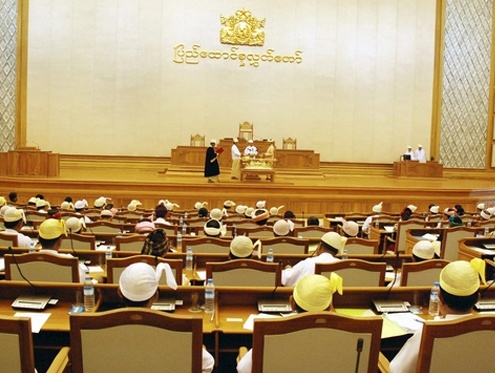President Thein Sein on Tuesday agreed to amend Burma’s constitutional tribunal law after an escalating standoff with the country’s parliament over the legality of the proposed changes, according to state media.
The changes will give parliament greater influence over the tribunal, but have been criticised for violating Burma’s 2008 constitution and the independence of the judiciary. Thein Sein has previously suggested that parliamentarians should first seek to amend certain sections of the constitution, which address the role of the tribunal, but was overruled by the legislature last week.
Legal analysts say the changes constitute a cynical attempt by parliament, which is dominated by former military cronies, to exert pressure on the tribunal without having to alter Burma’s controversial 2008 legislation.
“The majority members of the Hluttaw [parliament] come from the Union Solidarity and Development Party (USDP),” Aung Htoo from the Burma Lawyers’ Council told DVB, referring to the ruling military-backed party. “They would never dare to open the process for the amendment of the constitution. It would lead to a way for the people, and other members of the Hluttaw to amend other parts of the constitution.”
The new law hands parliament the authority to challenge the tribunal’s decisions, and greater input over the appointment of its chairman, who would in turn be required to report back to them and the president on his work, raising questions over his independence.
In the New Light of Myanmar today, Thein Sein reluctantly accepted the amendments, but insisted they would “hamper the jurisdiction of the highest constitutional court”. He added that it would now be up to the tribunal to rule on the constitutionality of the parliament’s decision.
The news follows months of disagreements over the role of Burma’s constitutional tribunal, which culminated in the resignation of all nine judges in September last year after parliament threatened to impeach them. The row kicked off in March when the court issued an order limiting the power of parliamentary committees and commissions – a decision which the new law overturns.
But Aung Htoo insists that parliament cannot overrule the tribunal’s previous decisions, even if they are “controversial and wrong”, without making a mockery of the rule of law.
“They know that their amended law is also against the 2008 constitution, but they ignored it, and why? Because they would like to control the judiciary, including the constitutional tribunal, so that they can strengthen their power and facilitate the rule of military dictatorship in Burma.”
Last week, parliament passed an unprecedented motion to investigate a blogger, who criticised the legislature for acting “above the law” in their standoff with the president. The blogger — dismissed by some as a government lackey — could face criminal defamation charges if identified.
Aung Thu Nyein from the Vahu Development Institute told DVB that the conflict with the president, which has been described as a jostle for power within the USDP, is likely to continue, despite the parliament “flexing its muscle” and securing the “upper hand”.
Burma’s constitution was drafted by the former junta and guarantees the military a firm hand in public affairs, including 25% of seats in parliament. Activists say the current dispute should not be used to distract from the challenge of changing its more controversial provisions.
“There are many complications and inconsistencies in the constitution,” said Ko Ni, a central court lawyer from Rangoon, who is leading a drive to change the legislation. “Most of our laws are in conflict with the constitution. It is one of its many problems.”



